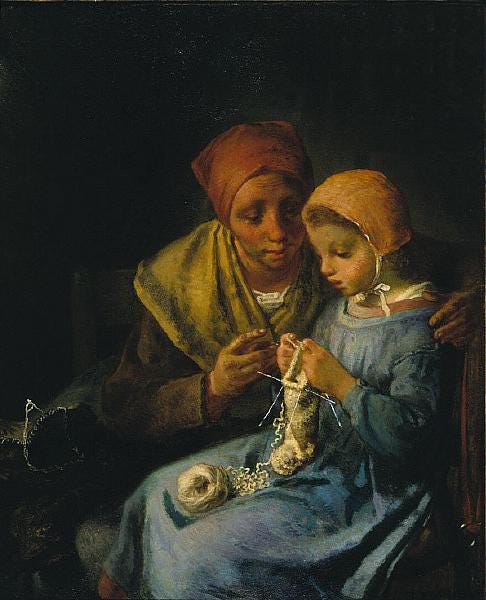On the wayside of the Appalachian Mountains sits a charming stone church, with a bell tower that no longer rings and a simple stained-glass window above the pulpit. The interior is warm, with chocolatey wood contrasting the stone walls. While the church is beautiful, it is the atmosphere of love and genuine welcome from the people that makes it truly special. When you attend, you’ll be greeted with smiles and care, and that warmth comes not just from the surroundings but from the hearts of the congregation.
This kind of loving atmosphere doesn’t just exist in churches; it is something we must cultivate at home. If we fail to create an atmosphere of love, our children will struggle to receive the lessons we want to impart. This is why the modern focus on utilitarian education, which often ignores the emotional and spiritual needs of the child, falls short. Today, we’ll explore what Mason means when she says “education is an atmosphere” by contrasting it with the modern idea that education is utilitarian.
What Does “Atmosphere” Mean in Education?
Charlotte Mason teaches that education is an atmosphere, and this refers to more than just physical surroundings. It is the tone, spirit, and environment in which children grow, shaped by the thoughts, words, and actions of those who teach and nurture them.
Mason’s ideas may seem like lofty ideals, and it’s easy to feel burdened by the gap between our reality and her vision. Yet, these ideals are not meant to discourage us but to point us toward God’s ultimate standard, revealed in Jesus Christ. He is the “ideal type” Mason encourages us to model, both for ourselves and for our children. Through Him, we have a perfect example of love, righteousness, and grace.
The atmosphere of our homes reflects our hearts. If I teach out of obligation or a sense of duty, the atmosphere becomes rigid and utilitarian. But if I focus on sharing ideas that are true, good, and beautiful—ideas that feed my child’s soul—I am creating an atmosphere that invites learning and growth.
Words also shape the atmosphere. Scripture reminds us that “out of the overflow of the heart, the mouth speaks.” The way we speak to our children and the way we speak about learning influences their attitudes and affections. Do my words inspire a love for truth, goodness, and beauty? Or do they reflect frustration or obligation? This is a challenge I face daily, but it’s an area where God’s grace meets my weakness.
Creating a life-giving atmosphere takes intentionality, and it begins with our relationship with Christ. As we grow in faith through prayer, community, and Scripture, we receive God’s strength to reflect His goodness in our homes. Small, consistent actions—like speaking with kindness, fostering peace, and prioritizing beautiful ideas—help shape the atmosphere.
Finally, our actions and habits reinforce the tone of the home. These habits, which we’ll explore in the next principle, provide the framework for an environment where children thrive.
So, the atmosphere is rooted in love, grace, and the pursuit of truth, goodness, and beauty. As we strive toward Mason’s ideals, we can find hope and encouragement in the grace of God, who equips us to create the atmosphere that allows our families to flourish.
Why is Atmosphere Crucial in Education?
Just as the church’s welcoming atmosphere can act as a barometer for the health and wellbeing of the church, so the atmosphere we provide our children in our homes can be a gauge pointing out what is going well and what areas of opportunity for growth. The atmosphere is one of three tools we have available to educate our children-- it is one of the few areas we can control. Once we realize that it is the mother-teacher who sets the tone of the atmosphere, we see our need for our Lord to help us do it well.
The congregation's smiles and sincere care creates a sense of belonging, a good atmosphere in the home and school rooms can support the work of the teacher because genuine curiosity, kindness, gentleness, patience, self-control, become part of the culture. “It’s just how we do things around here.”
Modern education focuses on measurable outcomes and goals, much like admiring the church’s stone walls but ignoring the warmth radiating from the congregation. An education that honors the child as a person must address the whole child-- mind, body, AND soul. This honors the child’s dignity and helps to show him how to bring his faculties to bear to glorify God and enjoy Him forever. True education must be whole.
How to Create an Educational Atmosphere
The church’s charm lies not in its pristine appearance but in its loving congregation. Similarly, the atmosphere we employ to teach our children should focus on relationships, not just perfect systems or materials (more on this in a later principle!). We can cultivate this by offering a loving smile to each child first thing in the morning. Greet him, say his name, and offer a hug sets the tone for the day more pointedly than a designer kitchen, or Instagram worthy schoolroom.
In our home, we have lots of art on the walls, books on the shelves, access to nature, art supplies, and music, this sets the tone for opportunities for creativity, leisurely activities, and discovery. I like to face books out to see if I can lure them with the cover. It works every time.
The love of the church members makes the church a place of peace and belonging. In education at home, this means showing genuine delight in the ideas we are learning about and in the child’s growth as a person. As mother-teachers we set the tone for how to sincerely love learning. We are the model our children look to for whether something is worthy of their time and attention. Likewise, we show our children they matter and that they are a delight to us when we offer encouragement as they struggle and celebrate with them in their successes. Again, it’s the heart that counts.
Contrasting Utilitarian Education with Charlotte Mason’s Vision
Modern education often values measurable results—like test scores or achievements—over the child’s emotional and spiritual well-being. This is akin to admiring the church’s architecture while ignoring the heart of its community. Education as an atmosphere recognizes that children thrive when their whole person—mind, heart, and spirit—is nurtured. A loving, welcoming atmosphere cannot be quantified, but it leaves a lasting impact on a child’s life, much like the warmth of the congregation in the stone church.
Education, like the atmosphere of the stone church, is about more than external structures. It is about cultivating warmth, love, and genuine care. It’s easy to focus on our checklists and forget that we are nurturing souls. But true education is soul-work - it’s good for the teacher, it’s good for the student and we are all nourished as we learn and grow together. Just as the church’s true beauty is found in its community, the essence of education is found in the love and atmosphere we offer to our children.
Final thoughts
Paraphrase: Children learn from the attitudes, moods, and tones of the people they spend time with just as much if not more than they are taught by the orderliness of their environment. Home is the best growing place for children because they learn best in their natural environment.
Antithesis: Education is utilitarian. The goal of usefulness is the only lens to view education. Worksheets, assembly lines, and robotic engagement are the best means to create children who will output what we input so they will become future income earners for the national GDP.
Theological truth: If I speak in the tongues of men and of angels, but have not love, I am a noisy gong or a clanging cymbal. And if I have prophetic powers, and understand all mysteries and all knowledge, and if I have all faith, so as to remove mountains, but have not love, I am nothing. If I give away all I have, and if I deliver up my body to be burned, but have not love, I gain nothing.
Love is patient and kind; love does not envy or boast; it is not arrogant or rude. It does not insist on its own way; it is not irritable or resentful; it does not rejoice at wrongdoing, but rejoices with the truth. Love bears all things, believes all things, hopes all things, endures all things. Love never fails. (1 Corinthians 13: 1-7)
A mother’s love, as described in 1 Corinthians 13, is patient, kind, humble, and respectful. She does not boast about her children or compare them to others; instead, she speaks to them with gentleness and grace. A mother who loves like this does not insist on her own way or grow irritable, but defers to God’s will, rejoicing in His truth even when it’s hard. Through God’s strength, she bears all things, believes all things, hopes all things, and endures all things. This love is not passive but active, giving life to the atmosphere of the home.
A mother rooted in the Word and Love of God will never fail her children. This atmosphere is energized by the loving Power of Jesus Christ who redeemed motherhood through His blood and gives us access to the Father. Many of us struggle in this area to bring the atmosphere we want to offer our children. We are not without hope and it’s not all up to us. We have many means of grace available to help strengthen us for the work at hand to cultivate a healthy atmosphere.
Reflection Questions:
Are there ways that I see only the practical sides of my work so that the love I can offer is missing?
What ways can I weave more love into our home through small touches of beauty? Flower arrangements? Nice table settings? Fun food choices? Hair styles for girls or boys that take more time but are enjoyable? Fun shoes or outfits? Lingering over a book? Taking the time to explore an idea that caught mine or my child’s interest?
How can I weave in a more loving atmosphere to our morning routine? School lessons? Chore time?
What areas of spiritual poverty do I see in myself or my family that I can pray for in the coming weeks?
What truths from God’s word and His creation can strengthen me to bring a more loving atmosphere into our home and homeschool?
If you want to be effective with your Nature Study work, check out my Nature Study Hacking Guides at www.naturestudyhacking.com. Learn how to get outside and use those lovely nature journals.
20 Principles of a Liberating Education:
#2 The Good and Evil Nature of Children
#3 Parents are in Charge and Children Must Obey
#4 Limits to Our Authority as Parents and Educators
#5 Education is an Atmosphere, a Discipline, a Life
Sources and further reader:
Home Education by Charlotte Mason
Towards a Philosophy of Education by Charlotte Mason
In Vital Harmony by Karen Glass
The Four Cardinal Virtues by Joseph Pieper















Share this post